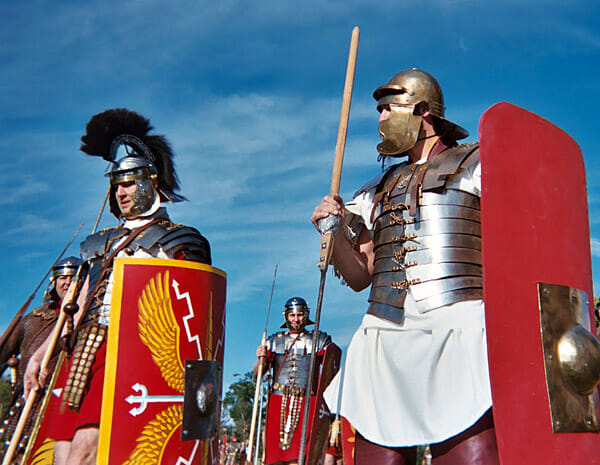The Recruit of the Republican Army (before the Reforms of Marius)
War offered the Roman citizen of the republic the possibility of returning covered in glory, having won both land and money.
To the Romans of the early republic serving in the legion and war itself were the same thing. For Rome had no army unless it was at war. As long as there was peace, people stayed at home and there was no army. This shows the essentially civilian nature of Roman society. But Rome is still famed today for being in a state of near constant warfare.
The changeover from peace to warfare was a mental as well as spiritual change. When war was decided upon by the senate then the doors to the temple of the god Janus would be opened. Only once Rome was at peace would the doors be closed again. – The gates of Janus were almost always open.
Who were Roman soldiers?
For the citizen becoming a soldier was a transformation far beyond simply donning his armour.
When war was declared and an army would be raised, a red flag was hoisted over the capitol of Rome. The news would be carried out to all the territory under Roman rule. The hoisting of the red flag meant that all men subject to military service had thirty days to report for duty.
Not all men were obliged to serve. Only the tax paying landowners were subject to military service, for it was deemed only they had reason to fight. Of them it was those aged between 17 and 46 who would have to serve. Those veterans of the infantry who had already been on sixteen previous campaigns, or the cavalrymen who had served on ten campaigns, would be excused. Also free from service would be those very few who had through outstanding military or civil contributions won the specific privilege of not having to take up arms.
How was the army formed?
In was on the capitol that the consul(s) would, together with their military tribunes select their men. First to be chosen from were the wealthiest, most privileged. Last to be chosen from were the poorest, least privileged. Care would be taken not to deplete completely the number of men of a particular class or tribe.
Selection thereafter depended largely on the men being deemed fit to serve. Though those deemed unfit for duty must have no doubt been dishonoured in the eyes of the others. For the army was in Roman eyes not so much a burden as an opportunity to prove oneself worthy in the eyes of one’s fellow countrymen. Meanwhile those who had shown themselves worthy in their civic duties were no longer required to do so. And those who had disgraced themselves in the eyes of the public, would be denied the opportunity of serving in the republican army !
From Roman citizen to Roman soldier
To perform their transformation from Roman citizens into Roman soldiers, the selected men would then have to swear an oath of allegiance.

This swearing of the sacramentum, changed the status of the man entirely. He was now utterly subject to his general’s authority, and had thereby laid down any restraints of his former civilian life. His actions would be by the will of the general. He would bear no responsibility for the actions he would commit for the general. If he was ordered to do so, he would kill anything in sight, be it an animal, a barbarian, or even a Roman.
There was more than mere practicality behind the change from the white toga of the citizen to the blood red tunic of the legionary. The symbolism was such that the blood of the vanquished would not stain him. He was now no longer a citizen whose conscience would not allow for murder. Now he was a Roman soldier. The legionary could only be released from the sacramentum by two things; death or demobilization. Without the sacramentum, however, the Roman could not be a soldier. It was unthinkable.
Once he had taken his oath, the Roman soldier would return home make the necessary preparations for his departure. The commander would have issued the order where they would have to assemble at a given date.
Once all was prepared, he would gather his weapons and make his way to the where the men had been ordered to gather. Very often this would entail quite a journey. The assembly tended to be close to the actual theatre of war.
And so it could be that the soldiers would be told to gather far away from Rome. For example, the Greek wars saw a commander order his army to assemble at Brundisium at the very heel of Italy, where they would be embarked on ships for their journey to Greece. It was upon the soldiers to get to Brundisium and it no doubt will have taken them some time to get there.

Roman soldier’s daily life
The day of assembly till the day of demobilization saw the legionary living a life, totally separated from the civilian existence of other Romans. He would not spend his time as a town garrison, but in a military camp miles from any place of civilization.
The camp the legionaries built every night while they were on the march fulfilled more than just the function of protecting Roman soldiers from attacks by night. For it maintained the Roman understanding of order; it didn’t merely keep army discipline, but set the soldiers apart from the barbarians they fought. It reinforced their being Roman. Barbarians might sleep wherever they laid themselves down like animals. But not Romans.
No longer being civilians, but soldiers, the diet had to be as hardy as their lifestyle. Wheat, frumentum, was what the soldier received to eat each day, come rain, come shine.
If it was monotonous, then it was also what the soldiers demanded. It was deemed good, hardy and pure. To deprive the soldiers’ of frumentum and give them something else instead was seen as a punishment.

When Caesar in Gaul struggled to keep his troops fed on wheat alone, and had to substitute their diet with barley, beans and meat, the troops grew discontented. It was only their fides, their loyalty , to the great Caesar which made them eat what they were given.
For just as with their attitudes toward their nightly encampment, the Romans saw the food they ate as soldiers as a symbol which set them apart from barbarians. If barbarians filled their bellies with meat and alcohol before battle, then the Romans kept to their stark rations. They had discipline, inner strength. To deny them their frumentum was to think of them as barbarians.
Discipline
In the Roman mind the legionary was a tool, a machine. Though it possessed dignity and honour, it abandoned its will to its commander. It ate and drank only in order to function. It required no pleasure.
This machine would feel nothing and flinch from nothing.
Being such a machine, the Roman soldier would neither feel cruelty nor mercy. He would kill simply because he was ordered. Totally devoid of passion he could not be accused of enjoying violence and indulging in cruelty. Far more his was a form of civilized violence.
Yet the Roman legionary must have been one of the most terrifying sights. By far more horrific than the savage barbarian. For if the barbarian simply knew no better, then the Roman soldier was a ice cold, calculating and utterly ruthless killing machine.
Totally different to the barbarian, Roman soldier’s strength lay in that he hated violence, but he possessed such total self control that he could force himself not to care.
The Recruit of the imperial Army (after the Reforms of Marius)
The typical recruit to the Roman army would present himself for his interview, armed with a letter of introduction.
The letter would generally have been written by his family’s patron, a local official, or perhaps his father.
The title for this interview was the probatio.
The first and one of the most important functions of the probatio was to establish the precise legal status of the applicant. After all, only Roman citizens were allowed to serve in the legion. And any native of Egypt for example could only be recruited into the fleet (unless he belonged to the ruling Graeco-Egyptian class).

Further there was also a medical examination, where the candidate to become a Roman soldier had to meet a minimum standard to be acceptable for service. There even appeared to have been a minimum height which was demanded. Though with the shortages of recruits in the later empire, these standards began to fall. There are even reports of potential recruits who cut off some of their fingers in order not to be useful for service. In answer to that the authorities decided to accept it if provincial administrators who were required to recruit a given number of men in their area, would manage to recruit two mutilated men in place of one healthy one.
The historian Vegetius tells us that there was a preference for recruits from certain professions. Smiths, wagon-makers, butchers and huntsmen were very welcome. Whereas applicants from professions associated with women’s occupations, like weavers, confectioners or even fishermen, were less desirable to the army.
Care was also given, especially in the increasingly more illiterate later empire, to establish if the recruits had some grasp of literacy and numeracy. the army required men of some education for certain posts. An army was a huge machine in need of men to oversee and note the delivery of supplies, pay and the performance of duties by the various units.
Once accepted by the probatio the recruit would receive advance pay and would be posted to a unit. This Roman soldier would then most likely travel in a small group of recruits, led perhaps by an officer, to where his unit was stationed.
Only once they had reached their unit and were entered on the rolls of the army, were they effectively soldiers. Before their entry onto the rolls, they were, even after their receipt of advance pay, still civilians. Though the prospect of the viaticum, an initial joining payment, most likely assured that no-one of the recruits changed their mind whilst in this strange legal situation of being a recruit to the army without being a member of it.
The rolls in the Roman army were initially known as numeri. But in time the expression was changed to be matriculae. This may well have been the case, due to the introduction of particular auxiliary forces with the name of numeri. The name therefore perhaps simply had to change in order to avoid misunderstandings.
Before being accepted onto the rolls, they would then have to swear the military oath, which would legally bind them to the service. Though this swearing in may well have only have been a ritual of the early empire. The later empire, which didn’t’ refrain from tattooing, or even branding its new soldiers, might well have dispensed with niceties such as swearing-in ceremonies.

Historian Franco Cavazzi dedicated hundreds of hours of his life to creating this website, roman-empire.net as a trove of educational material on this fascinating period of history. His work has been cited in a number of textbooks on the Roman Empire and mentioned on numerous publications such as the New York Times, PBS, The Guardian, and many more.
